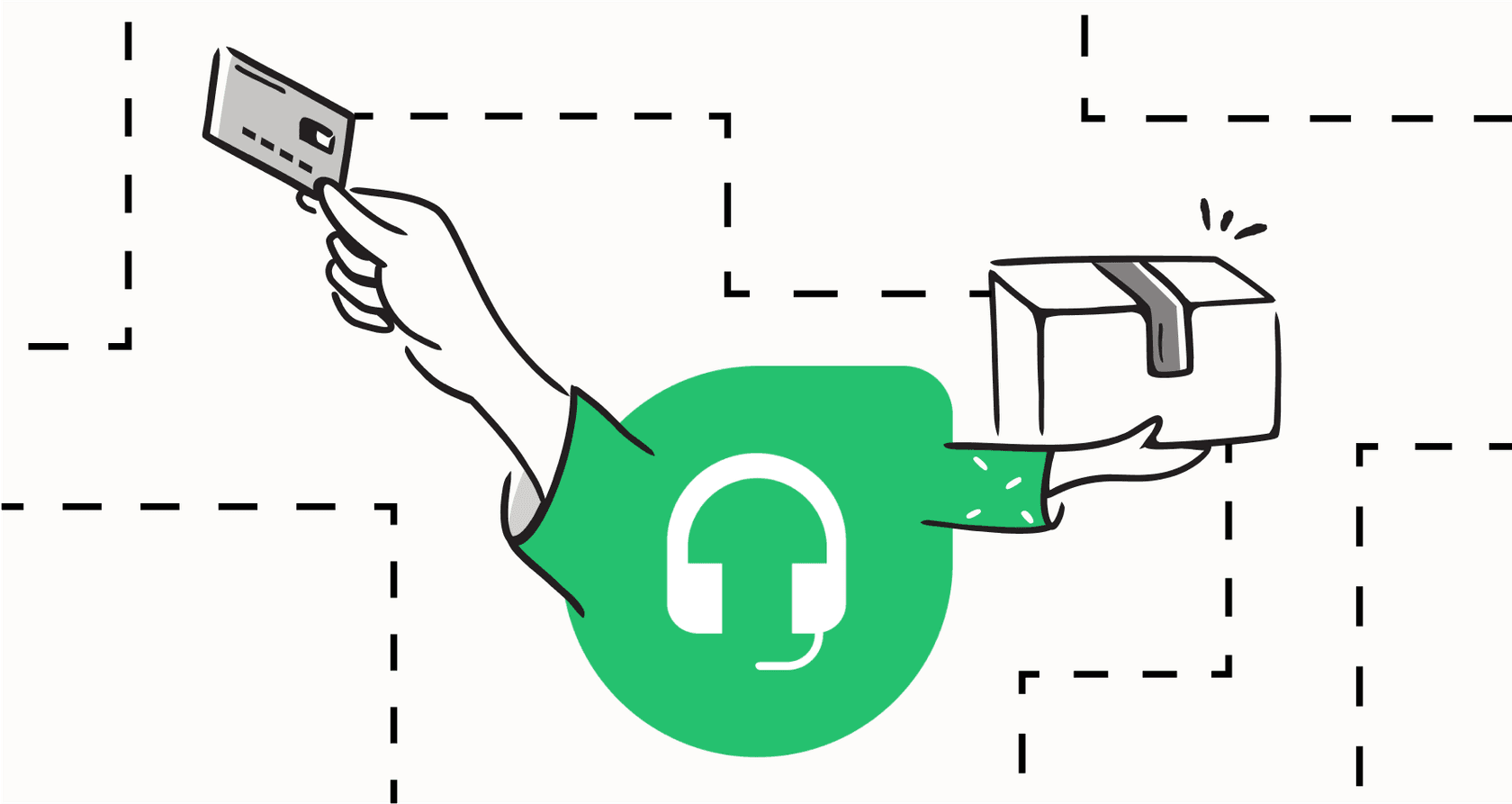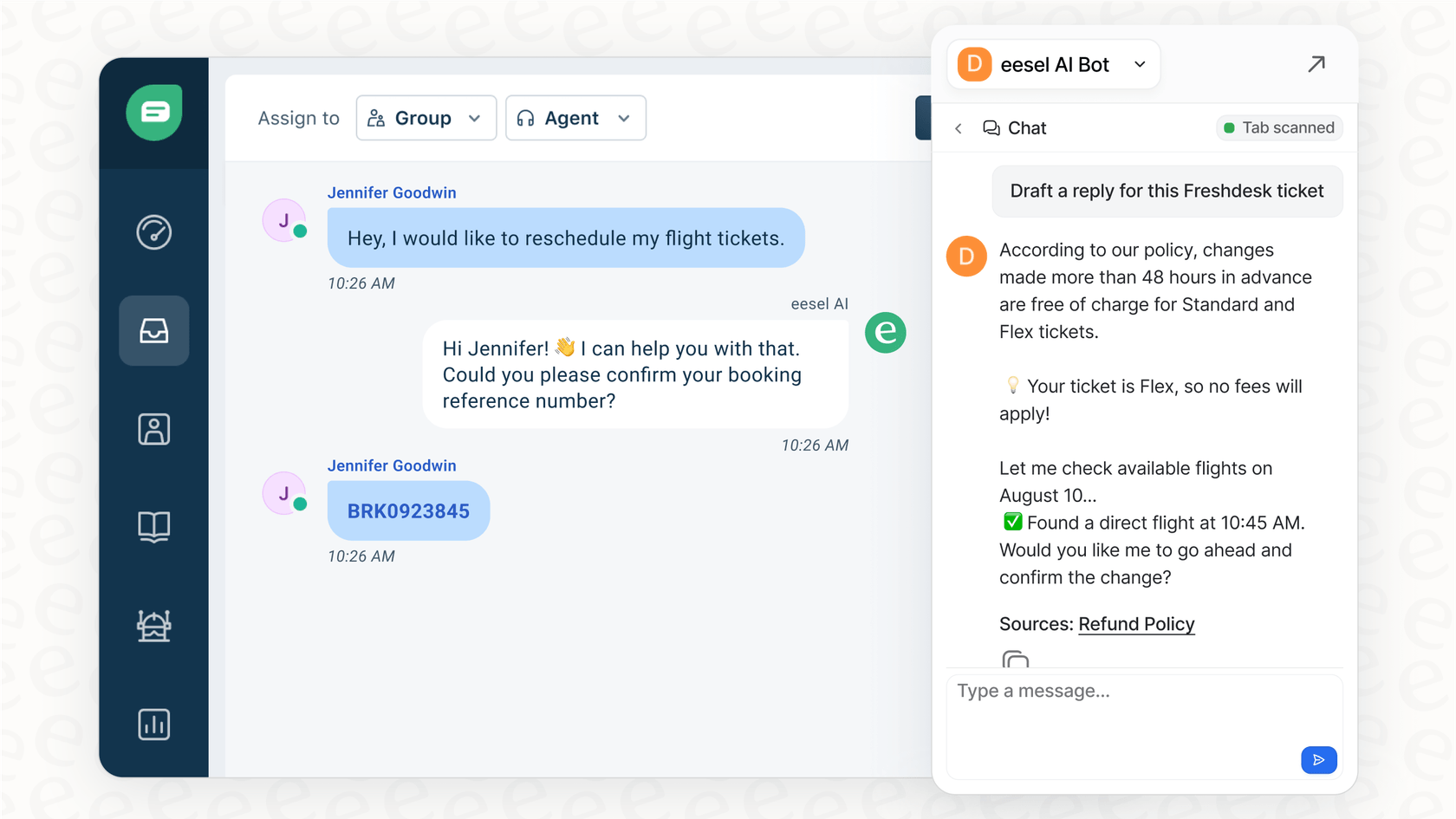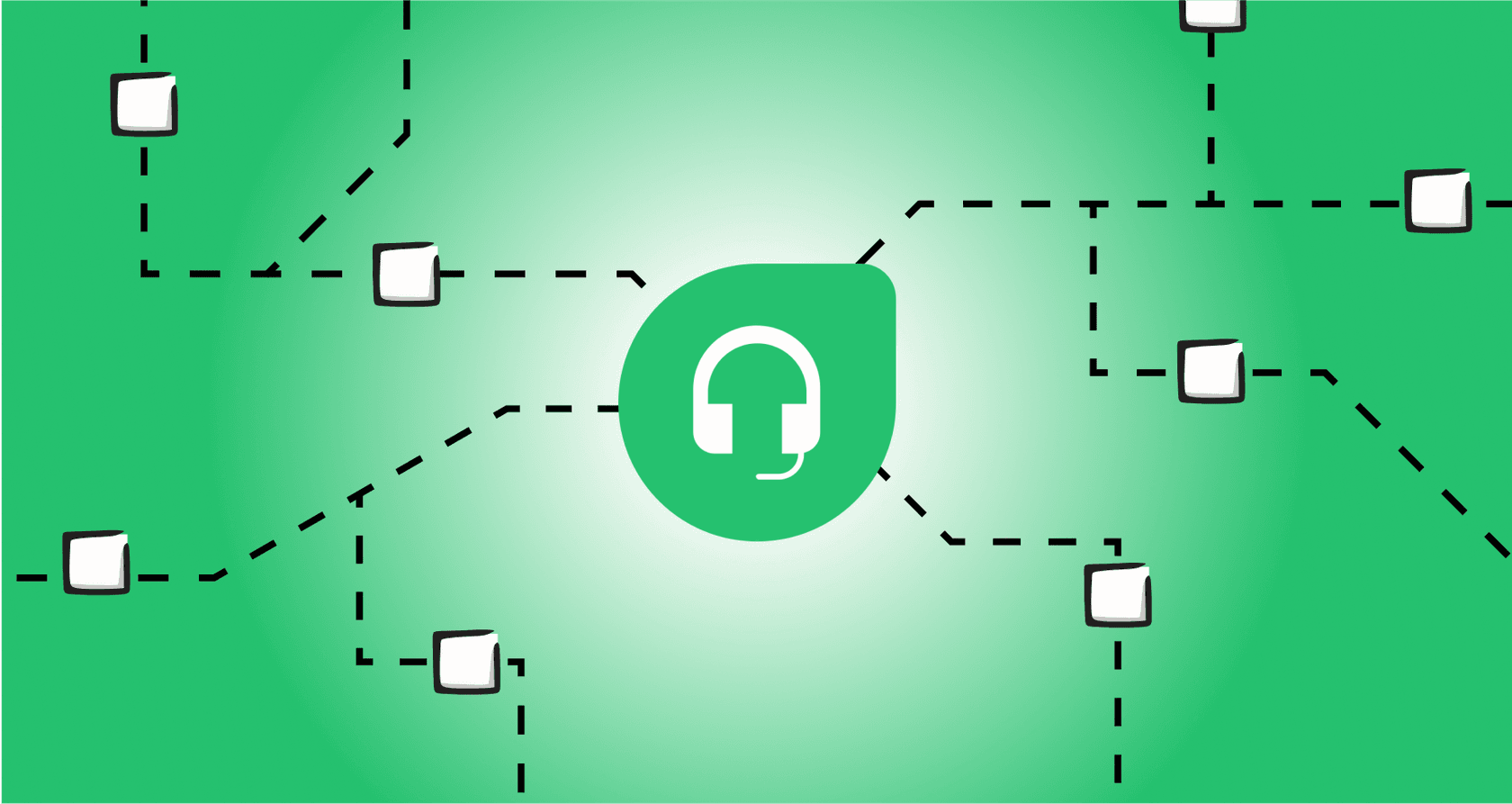A complete guide to Freshdesk skill based routing in 2026

Stevia Putri

Stanley Nicholas
Last edited January 16, 2026
Expert Verified

Let's be real for a second. There’s nothing more challenging than watching tickets pile up in the wrong agent’s queue. Your most experienced people end up grabbing the easy ones, while the truly tricky issues get bounced around. Before you know it, your response times are affected and everyone’s a little more stressed.
Getting tickets to the right person, right away, is a great way to fix that bottleneck. That’s the promise of Freshdesk skill based routing, a robust feature built to match incoming tickets with agents who have the specific know-how to solve them.
In this guide, we’ll walk through what Freshdesk’s skill based routing is and how to get it running. But more importantly, we’ll look at how to maximize its effectiveness and when to consider a modern AI layer for even smarter automation without you having to change the tools your team already relies on.
What is Freshdesk skill based routing?
So, what exactly is Freshdesk skill based routing? Think of it as a traffic cop for your support inbox. Instead of just letting tickets flow into one big pile for anyone to grab, it directs each query to the agent best equipped to handle it from the get-go.
It all boils down to two key parts:
-
Skill Rules: These are the "if-then" conditions you set up. For instance, you could create a rule that says, "If a ticket comes in and the language field is set to 'French,' then tag this ticket with the 'French' skill."
-
Agent Skills: This is where you map those skills back to your team. You go into each agent’s profile and assign them the skills they possess, ranking them in order of expertise. Maybe an agent's number one skill is "Billing," followed by "Refunds." The system uses that ranking to prioritize who gets what.
Freshdesk says this helps you get faster responses, prioritize important issues, and manage workloads to keep your team balanced. It’s a powerful step up from a simple round-robin system, providing a reliable foundation for organized ticket management.
graph TD A[Incoming Ticket] --> B{Skill Rules Check}; B -- Language is French --> C[Tag with 'French' Skill]; C --> D{Assign to Agent}; D -- Agent A has 'French' Skill --> E[Ticket Assigned to Agent A]; B -- Priority is High --> F[Tag with 'VIP' Skill]; F --> G{Assign to Agent}; G -- Agent B has 'VIP' Skill --> H[Ticket Assigned to Agent B];
How to set up Freshdesk skill based routing
Before we get into the nuts and bolts, you should know this feature is available on the Freshdesk Enterprise plan. This plan is designed for teams that need high-level control and scalability.
Here’s a look at what the setup process involves, which gives you a good idea of the granular control you have over the system.
Step 1: Create your skills
First things first, you need to define all the skills your team possesses. You do this by heading over to Admin > Skills > Create Skill.
Here, you'll manually type in a name for each skill (like "Billing Issues," "Product A Expertise," "Spanish Language") and set the conditions that will automatically tag a ticket with that skill. These conditions are based on the ticket fields you already use, like ticket type, priority, or custom fields you’ve created. You can make the rule trigger if any or all of the conditions are met.
This process ensures that your routing is highly predictable. The system relies on the clear data fields you've established to ensure tickets go exactly where you want them to go.
Step 2: Assign agent skills and set priorities
Once your skills are defined, it’s time to tell Freshdesk who can do what. You have to assign these skills to each of your agents, which can be done from the skill page, the main agent list, or an individual agent's profile.
For every single agent, you can drag and drop their skills into a priority order. This tells the system how to assign tickets when multiple agents have the same skill. If an agent’s top skill is "Damaged Product," they’ll get first dibs on those tickets over any "Order Tracking" tickets that are also in the queue.
Freshdesk does offer a CSV import to speed this up for larger teams. This feature is designed for precision, ensuring that your team's expertise is mapped correctly into the platform.
Step 3: Enable skill based routing in groups
The last piece of the puzzle is to actually switch it on. You’ll need to go to Admin > Groups, choose the group you want to apply this logic to, and select "Skill-based ticket assignment" from the automatic assignment options.
This is also where you can link it to Omniroute, Freshdesk’s feature for setting agent capacity limits, which helps manage workloads effectively.
While this setup gives you excellent control, there are some additional ways to enhance this logic as your team grows.
Considerations for native Freshdesk skill based routing
While the native routing system is a strong and reliable tool, it’s helpful to understand its logic so you can decide when to supplement it with additional AI capabilities.
Consideration 1: Rule-based precision Freshdesk's routing is based on the specific rules you create. This provides great predictability, as you know exactly why a ticket was routed to a certain person. For more complex cases where you want the system to understand nuance or customer sentiment automatically, you can consider adding an AI layer to assist with the categorization.
Consideration 2: Human-led updates The system follows the logic you provide, ensuring you have total oversight of the routing process. As new types of issues emerge, you can manually update your rules to keep the system current. For teams looking for a system that can suggest updates based on past conversations, an integrated AI tool can be a helpful addition.
Consideration 3: Focus on helpdesk data The native routing logic is designed to work seamlessly with the information inside Freshdesk. If your company’s knowledge is spread across multiple external platforms like Confluence or Google Docs, an external AI layer can help connect those dots, allowing you to use that external knowledge to inform your Freshdesk workflows even more deeply.
So if you're looking to extend the power of the built-in system, what's the next step? This is where a dedicated AI platform like eesel AI comes into play. It acts as an intelligent layer on top of your helpdesk, enhancing these native capabilities.
Beyond rules: AI-powered routing
Instead of relying solely on rule-based logic, eesel AI brings additional intelligence to your workflow, working alongside Freshdesk to make your team even more efficient.
It understands intent through generative AI eesel AI uses generative AI to read and understand the intent of a ticket. It analyzes the context of the conversation and can help route tickets based on what the customer is truly asking for. This works beautifully with Freshdesk, ensuring that even nuanced queries find the right home quickly.
It identifies expertise from past resolutions The AI Triage from eesel AI can help identify which agents or macros have been most effective for certain issues in the past. It can suggest routing options based on historical successes, acting as a helpful assistant that complements your existing Freshdesk skill rules.

It connects all your company knowledge eesel AI integrates with over 100 different sources, from wikis to internal notes. It connects all your company knowledge in Confluence, Google Docs, Notion, and more. This allows it to inform routing decisions based on your entire company's internal brain, making your Freshdesk setup even more powerful.

It supports the entire ticket lifecycle eesel AI doesn’t just help with routing; it can also help with tagging, setting priority, and adding internal notes to give agents more context. It can even help resolve common, repetitive tickets on its own, allowing your agents to focus on the high-value work they do best.
Think of it this way:
With Native Freshdesk Routing, you have a reliable, rule-based system that ensures tickets are assigned exactly according to your established criteria.
With eesel AI on Freshdesk, you add a layer of intelligence that understands intent and context, cross-referencing all your company's data to support your team in routing, tagging, and resolving tickets more effectively.

Pricing comparison: Freshdesk skill based routing plans vs. an AI layer
How do these two approaches compare when it comes to pricing?
Freshdesk Pricing Freshdesk skill based routing is a core feature of the Enterprise plan, which provides a comprehensive suite of tools for support teams. For teams wanting to add native AI features, Freshdesk offers the Freddy AI Copilot as a powerful add-on.
| Plan | Price (Billed Annually) | Skill based routing | Freddy AI Copilot Add-on |
|---|---|---|---|
| Pro | $49/agent/month | No | $29/agent/month |
| Enterprise | $79/agent/month | Yes | $29/agent/month |
eesel AI Pricing eesel AI offers a straightforward pricing model where core tools like the AI Agent, Copilot, and Triage are included. It provides a flat-rate structure that doesn't charge per resolution, making it a predictable option for teams with varying ticket volumes.
Plans start at $239/month (billed annually) for the Team plan, providing AI tools for your entire team to enhance your Freshdesk experience.
The verdict: When to use Freshdesk skill based routing vs. an AI platform
So, what’s the final call?
Freshdesk skill based routing is a robust, enterprise-grade feature. It’s a solid step up from standard round-robin systems, particularly for teams on the Enterprise plan who value having precise, rule-based control over their ticket assignments. If your workflows are clear and defined, it’s a highly effective tool.
However, for teams that want to layer on more flexibility and self-improving automation that learns from all company knowledge, adding a dedicated AI layer like eesel AI is the way to go. It doesn't replace Freshdesk; it enhances it, making your existing setup even more capable and efficient.
By adding an AI engine like eesel AI to your Freshdesk ecosystem, you can move from just managing work to truly automating the resolution process. If you're curious, you can see how it would work with your own data by simulating it on your tickets today.
Frequently asked questions
Freshdesk skill based routing is a system designed to automatically assign incoming support tickets to agents who possess the most relevant skills. It operates by matching predefined ticket conditions (rules) with skills assigned to individual agents, helping direct queries more efficiently from the start.
To utilize Freshdesk skill based routing, you can access it via the Freshdesk Enterprise plan. This plan offers advanced capabilities for larger teams looking to implement sophisticated routing logic.
The setup process for Freshdesk skill based routing allows for precise control. It requires you to define each skill, create "if-then" rules to tag tickets, and then individually assign and prioritize these skills for every agent on your team.
Freshdesk skill based routing focuses on rule-based logic to provide consistent results. It uses the data within your helpdesk to ensure agents are matched with tickets based on the specific fields and expertise you define, while AI layers can further enhance this by understanding customer intent across external company knowledge.
To ensure full human control, Freshdesk skill based routing follows the specific rules you define. If new types of issues emerge, you can easily update your skill rules and conditions for the system to recognize and route them correctly.
While Freshdesk skill based routing assigns based on skills, it can be linked with Omniroute to consider agent capacity limits. This helps prevent single agents from being overloaded with tickets once skill-based assignment is enabled.
An external AI layer significantly enhances Freshdesk skill based routing by providing deeper understanding of customer intent, learning from historical successes, integrating with all company knowledge sources, and even fully automating ticket resolutions.
Share this post

Article by
Stevia Putri
Stevia Putri is a marketing generalist at eesel AI, where she helps turn powerful AI tools into stories that resonate. She’s driven by curiosity, clarity, and the human side of technology.




